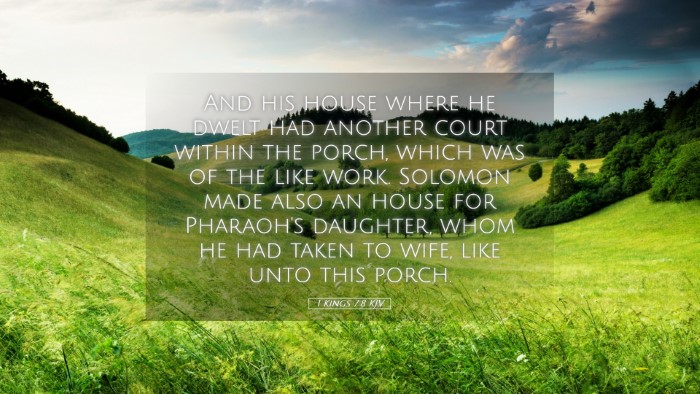Commentary on 1 Kings 7:8
The verse reads: "And his house where he dwelt had another court within the porch, which was of the like work. Solomon made also an house for Pharaoh's daughter, whom he had taken to wife, like unto this porch."
Contextual Overview
In this passage, we find King Solomon's architectural achievements, which reflect not only his wealth but also his political alliances, particularly through marriage. Solomon's building endeavors show how he combined functionality with splendor, which speaks volumes about his reign and the cultural context of ancient Israel.
Architectural Significance
Solomon’s structure was characterized by grandeur and intricate design, embodying not only beauty but also meticulous planning. The mention of "another court within the porch" indicates that Solomon’s decisions were intentional, as courts often served both as protective spaces and as venues for social and political activities.
Insights from Matthew Henry
Matthew Henry emphasizes that the placement of Pharaoh’s daughter’s house signifies a diplomatic gesture, showcasing Solomon’s strategies in alliance-building. He notes that the elaborate construction exemplifies the security and stability that Solomon’s reign offered. Henry writes about the lavishness and the great effort put into these structures as reflections of God’s blessings upon Solomon for his wisdom and requests for a heart to govern wisely.
Insights from Albert Barnes
Albert Barnes further elaborates on the socio-political implications of Solomon’s marriage to Pharaoh’s daughter. He interprets this act as strategic, aimed at solidifying peace and fostering relationships with Egypt, a powerful neighboring nation at the time. Barnes points out that the construction of a house specifically for her demonstrates Solomon’s respect and cultural accommodation for foreign alliances, which was not uncommon among ancient monarchs.
Insights from Adam Clarke
Adam Clarke provides an analysis focusing on the significance of the architectural elements. He highlights the "like work" in both the dwelling for Solomon and the space designated for Pharaoh’s daughter, suggesting artistic unity and intentional design across royal residences. Clarke places emphasis on the symbolic importance of these constructions, viewing them as a reflection of Solomon’s wealth, wisdom, and ability to coexist with foreign powers while still maintaining his sovereignty.
Theological Implications
This verse invites readers to explore deeper theological themes surrounding authority, stewardship, and covenantal relationships.
- Divine Blessing: The intricate design and lavishness of the structure are seen as manifestations of God’s favor in response to Solomon’s request for wisdom (1 Kings 3:9). Solomon's successful reign is viewed as a dual blessing of wisdom and wealth, signifying that God blesses those who seek His will.
- Marriage as Alliance: The marital union with Pharaoh’s daughter is illustrative of broader themes of covenants and alliances in Scripture. It emphasizes how relationships, both spiritual and earthly, play a crucial role in the unfolding narrative of God's people.
- Role of Architecture in Worship: The significance of building grand structures is presented in biblical narrative not merely as a pursuit of opulence but as a means to honor God within the cultural limitations of the time. This relates to how spaces created for divine worship and community reflect one's commitment to God.
Pastoral Applications
For pastors delivering a message drawn from this passage, several key applications can be highlighted:
- Understanding God’s Provision: Emphasizing that God’s provisions in leadership require wisdom. Just as Solomon built a kingdom reflecting God’s glory, church leaders are called to steward their resources wisely to reflect the love of Christ.
- Importance of Relationship Building: Leaders can learn from the significance of alliances and partnerships, both within the church and in the community. Solomon’s marriage demonstrates the importance of forging connections that promote peace and cooperative growth in ministry.
- Celebrating God’s Gift of Wisdom: Teach congregations to seek wisdom in decision-making, demonstrating that divine guidance brings abundance and success. This can parallel the wisdom found in leading churches today.
Conclusion
1 Kings 7:8 serves as a remarkable snapshot of Solomon's reign, rich in architectural and relational significance. This verse encourages readers to contemplate the intersection of divine wisdom, human endeavor, and the socio-political dynamics of leadership in the biblical narrative. For scholars and theologians, the implications are both vast and profound, encouraging reflections on God's sovereignty in history, the role of leadership, and our responsibilities in fostering meaningful alliances and stewardship in contemporary faith communities.


